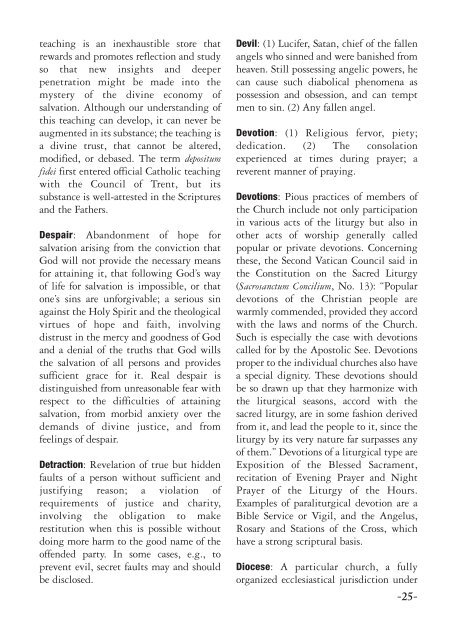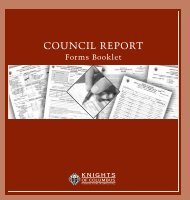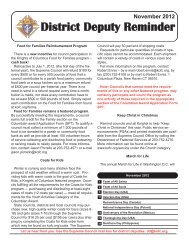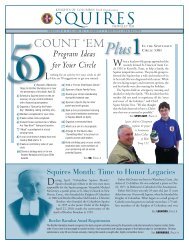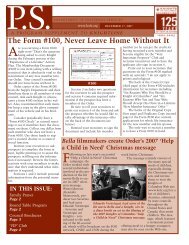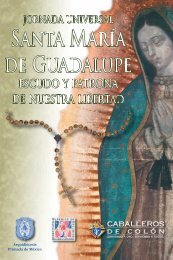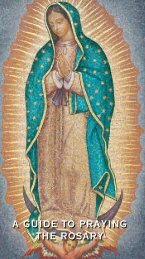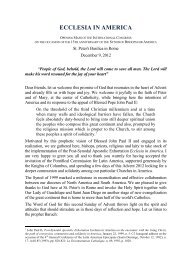CATHOLIC WORD BOOK - Knights of Columbus, Supreme Council
CATHOLIC WORD BOOK - Knights of Columbus, Supreme Council
CATHOLIC WORD BOOK - Knights of Columbus, Supreme Council
You also want an ePaper? Increase the reach of your titles
YUMPU automatically turns print PDFs into web optimized ePapers that Google loves.
teaching is an inexhaustible store that<br />
rewards and promotes reflection and study<br />
so that new insights and deeper<br />
penetration might be made into the<br />
mystery <strong>of</strong> the divine economy <strong>of</strong><br />
salvation. Although our understanding <strong>of</strong><br />
this teaching can develop, it can never be<br />
augmented in its substance; the teaching is<br />
a divine trust, that cannot be altered,<br />
modified, or debased. The term depositum<br />
fidei first entered <strong>of</strong>ficial Catholic teaching<br />
with the <strong>Council</strong> <strong>of</strong> Trent, but its<br />
substance is well-attested in the Scriptures<br />
and the Fathers.<br />
Despair: Abandonment <strong>of</strong> hope for<br />
salvation arising from the conviction that<br />
God will not provide the necessary means<br />
for attaining it, that following God’s way<br />
<strong>of</strong> life for salvation is impossible, or that<br />
one’s sins are unforgivable; a serious sin<br />
against the Holy Spirit and the theological<br />
virtues <strong>of</strong> hope and faith, involving<br />
distrust in the mercy and goodness <strong>of</strong> God<br />
and a denial <strong>of</strong> the truths that God wills<br />
the salvation <strong>of</strong> all persons and provides<br />
sufficient grace for it. Real despair is<br />
distinguished from unreasonable fear with<br />
respect to the difficulties <strong>of</strong> attaining<br />
salvation, from morbid anxiety over the<br />
demands <strong>of</strong> divine justice, and from<br />
feelings <strong>of</strong> despair.<br />
Detraction: Revelation <strong>of</strong> true but hidden<br />
faults <strong>of</strong> a person without sufficient and<br />
justifying reason; a violation <strong>of</strong><br />
requirements <strong>of</strong> justice and charity,<br />
involving the obligation to make<br />
restitution when this is possible without<br />
doing more harm to the good name <strong>of</strong> the<br />
<strong>of</strong>fended party. In some cases, e.g., to<br />
prevent evil, secret faults may and should<br />
be disclosed.<br />
Devil: (1) Lucifer, Satan, chief <strong>of</strong> the fallen<br />
angels who sinned and were banished from<br />
heaven. Still possessing angelic powers, he<br />
can cause such diabolical phenomena as<br />
possession and obsession, and can tempt<br />
men to sin. (2) Any fallen angel.<br />
Devotion: (1) Religious fervor, piety;<br />
dedication. (2) The consolation<br />
experienced at times during prayer; a<br />
reverent manner <strong>of</strong> praying.<br />
Devotions: Pious practices <strong>of</strong> members <strong>of</strong><br />
the Church include not only participation<br />
in various acts <strong>of</strong> the liturgy but also in<br />
other acts <strong>of</strong> worship generally called<br />
popular or private devotions. Concerning<br />
these, the Second Vatican <strong>Council</strong> said in<br />
the Constitution on the Sacred Liturgy<br />
(Sacrosanctum Concilium, No. 13): “Popular<br />
devotions <strong>of</strong> the Christian people are<br />
warmly commended, provided they accord<br />
with the laws and norms <strong>of</strong> the Church.<br />
Such is especially the case with devotions<br />
called for by the Apostolic See. Devotions<br />
proper to the individual churches also have<br />
a special dignity. These devotions should<br />
be so drawn up that they harmonize with<br />
the liturgical seasons, accord with the<br />
sacred liturgy, are in some fashion derived<br />
from it, and lead the people to it, since the<br />
liturgy by its very nature far surpasses any<br />
<strong>of</strong> them.” Devotions <strong>of</strong> a liturgical type are<br />
Exposition <strong>of</strong> the Blessed Sacrament,<br />
recitation <strong>of</strong> Evening Prayer and Night<br />
Prayer <strong>of</strong> the Liturgy <strong>of</strong> the Hours.<br />
Examples <strong>of</strong> paraliturgical devotion are a<br />
Bible Service or Vigil, and the Angelus,<br />
Rosary and Stations <strong>of</strong> the Cross, which<br />
have a strong scriptural basis.<br />
Diocese: A particular church, a fully<br />
organized ecclesiastical jurisdiction under<br />
-25-


